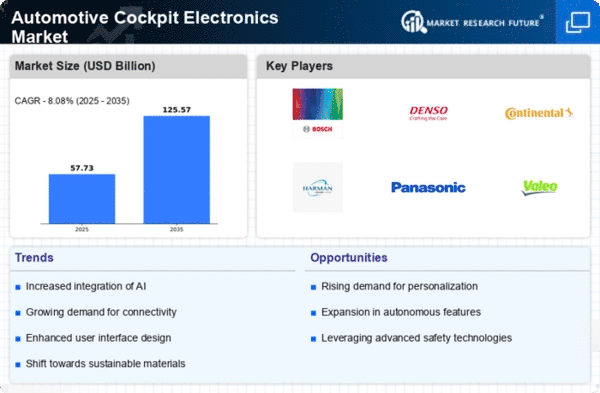Top Industry Leaders in the Automotive Cockpit Electronics Market

*Disclaimer: List of key companies in no particular order
Top listed companies in the Automotive Cockpit Electronics industry are:
Robert Bosch GmbH (Germany)
Continental AG (Germany)
Harman International (U.S)
Visteon Corporation (US)
Delphi Autornotive PLC (U.K)
Denso Corp. (Japan)
Alpine Electronics Inc. (Japan)
Johnson Controls (U.S.)
IAV (Germany)
Magneti Marelli (Italy)
Giants in the Driver's Seat: Established industry titans like Visteon, Continental AG, Harman International, and Bosch hold significant market shares. Their competitive edge lies in a combination of factors:
Technological Prowess: Continuous investment in R&D fuels innovation in advanced displays, connectivity solutions, and ADAS functionalities, keeping them ahead of the curve.
Strategic Partnerships: Collaborations with automakers, tech giants, and chipmakers strengthen their supply chains and expand their product portfolios.
Global Reach: Established distribution networks and manufacturing footprints give them access to diverse markets and economies of scale.
New Entrants Revving Up: Startups and tech giants are entering the arena, challenging traditional players with agility and disruptive technologies. Notable examples include:
Tesla: Pioneering in-car software and user interfaces, setting a benchmark for seamless connectivity and intuitive controls.
Apple and Google: Leveraging their expertise in smartphone ecosystems to develop car-integrated platforms and voice-activated assistants.
Startups like Aptiv and Magna: Focusing on niche areas like self-driving technologies and AI-powered driver assistance systems.
Factors Shaping Market Share: Analyzing market share goes beyond volume and revenue. Key metrics to consider include:
Technology Leadership: The ability to consistently introduce cutting-edge features and solutions holds immense value.
Regional Penetration: Dominating high-growth markets like Asia-Pacific and ensuring strong presence in mature markets like Europe and North America is crucial.
Customer Satisfaction: Building brand loyalty through superior user experience and after-sales service will determine long-term success.
Emerging Trends Reshaping the Game: The future of automotive cockpits is brimming with exciting possibilities:
Hyper-personalization: Customizable displays, voice-activated controls, and AI-powered recommendations will tailor the driving experience to individual preferences.
Augmented Reality (AR): AR head-up displays will overlay navigational information and warnings onto the real world, enhancing safety and awareness.
Seamless Connectivity: 5G technology will enable real-time traffic updates, V2X communication, and cloud-based services, transforming cars into connected hubs.
Biometric Integration: Health monitoring through sensors and fatigue detection systems will promote driver well-being and prevent accidents.
The Overall Competitive Scenario: The automotive cockpit electronics market is a complex ecosystem where established players, tech giants, and nimble startups are vying for dominance. Success hinges on a compelling blend of cutting-edge technology, strategic partnerships, regional prowess, and customer-centricity. Those who adapt to the evolving landscape of hyper-connectivity, personalization, and safety-driven innovations will be the frontrunners in this thrilling race towards the future of the automobile.
Latest Company Updates:
Robert Bosch GmbH (Germany):
- Announced partnership with HERE Technologies for real-time traffic and navigation integration in cockpits (October 2023, Bosch press release).
Continental AG (Germany):
- Showcased new "Hypervisor" technology for integrating diverse cockpit systems without performance issues (September 2023, Continental website).
Harman International (U.S.):
- Launched its "IVI.ai" platform for personalized in-vehicle infotainment experiences (December 2023, Harman website).
Delphi Technologies PLC (U.K.):
• Showcased its "Delphi Virtual Cockpit" concept with customizable displays and ADAS integration (CES 2024, Delphi website).










